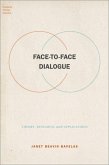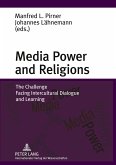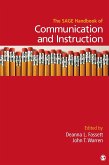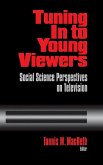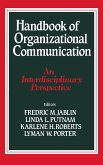Rob Anderson, Leslie A. Baxter, Kenneth N Cissna
Dialogue
Theorizing Difference in Communication Studies
Schade – dieser Artikel ist leider ausverkauft. Sobald wir wissen, ob und wann der Artikel wieder verfügbar ist, informieren wir Sie an dieser Stelle.
Rob Anderson, Leslie A. Baxter, Kenneth N Cissna
Dialogue
Theorizing Difference in Communication Studies
- Gebundenes Buch
- Merkliste
- Auf die Merkliste
- Bewerten Bewerten
- Teilen
- Produkt teilen
- Produkterinnerung
- Produkterinnerung
Dialogue: Theorizing Difference in Communication Studies is the first anthology of work on dialogic approaches to communication that offers a state-of-the-art collection of original essays in this emerging research area. Editors Rob Anderson, Leslie A. Baxter, and Kenneth N. Cissna have gathered the most respected scholars in the field to describe their research projects, discuss critical elements of dialogue, and anticipate the evolution of the study of dialogue. With a foreword by Julia T. Wood, contributors include James R. Taylor, Stanley Deetz and Jennifer Simpson, Sheila McNamee and John Shotter, and Mark McPhail.…mehr
Andere Kunden interessierten sich auch für
![Fractured Fandoms Fractured Fandoms]() Carrielynn D. ReinhardFractured Fandoms121,99 €
Carrielynn D. ReinhardFractured Fandoms121,99 €![Face-To-Face Dialogue Face-To-Face Dialogue]() Janet Beavin BavelasFace-To-Face Dialogue120,99 €
Janet Beavin BavelasFace-To-Face Dialogue120,99 €![Media Power and Religions Media Power and Religions]() Media Power and Religions68,95 €
Media Power and Religions68,95 €![The Handbook of Communication Science The Handbook of Communication Science]() Charles R. BergerThe Handbook of Communication Science171,99 €
Charles R. BergerThe Handbook of Communication Science171,99 €![The SAGE Handbook of Communication and Instruction The SAGE Handbook of Communication and Instruction]() Deanna L. FassettThe SAGE Handbook of Communication and Instruction162,99 €
Deanna L. FassettThe SAGE Handbook of Communication and Instruction162,99 €![Tuning In to Young Viewers Tuning In to Young Viewers]() Tannis M. MacbethTuning In to Young Viewers172,99 €
Tannis M. MacbethTuning In to Young Viewers172,99 €![Handbook of Organizational Communication Handbook of Organizational Communication]() Frederic M JablinHandbook of Organizational Communication162,99 €
Frederic M JablinHandbook of Organizational Communication162,99 €-
Dialogue: Theorizing Difference in Communication Studies is the first anthology of work on dialogic approaches to communication that offers a state-of-the-art collection of original essays in this emerging research area. Editors Rob Anderson, Leslie A. Baxter, and Kenneth N. Cissna have gathered the most respected scholars in the field to describe their research projects, discuss critical elements of dialogue, and anticipate the evolution of the study of dialogue. With a foreword by Julia T. Wood, contributors include James R. Taylor, Stanley Deetz and Jennifer Simpson, Sheila McNamee and John Shotter, and Mark McPhail.
Produktdetails
- Produktdetails
- Verlag: Sage Publications, Inc
- Seitenzahl: 340
- Erscheinungstermin: 30. Oktober 2003
- Englisch
- Abmessung: 240mm x 161mm x 23mm
- Gewicht: 675g
- ISBN-13: 9780761926702
- ISBN-10: 0761926704
- Artikelnr.: 21662305
- Herstellerkennzeichnung
- Libri GmbH
- Europaallee 1
- 36244 Bad Hersfeld
- gpsr@libri.de
- Verlag: Sage Publications, Inc
- Seitenzahl: 340
- Erscheinungstermin: 30. Oktober 2003
- Englisch
- Abmessung: 240mm x 161mm x 23mm
- Gewicht: 675g
- ISBN-13: 9780761926702
- ISBN-10: 0761926704
- Artikelnr.: 21662305
- Herstellerkennzeichnung
- Libri GmbH
- Europaallee 1
- 36244 Bad Hersfeld
- gpsr@libri.de
Rob Anderson, professor of communication and professor of international studies at Saint Louis University, teaches and learns about dialogue in campus settings, interpersonal relationships, and media institutions. His articles on these topics have appeared since 1972 in journals from a variety of disciplines. A vigorous advocate of the dialogue of coauthorship, Rob's ten books include texts in communication theory and interviewing, as well as scholarly studies of public dialogue in contemporary journalism and intellectual history--The Conversation of Journalism (Praeger, 1994), The Reach of Dialogue (Hampton Press, 1994), The Martin Buber-Carl Rogers Dialogue (SUNY, 1997), and Moments of Meeting (SUNY, 2002). He believes the following to be therapeutic: Quiet dinners with Dona, sitting on the porch, watching soccer, Miles Davis on the stereo, and classes that talk back. Leslie A. Baxter is F. Wendell Miller Distinguished Professor of Communication Studies at the University of Iowa, where she has taught for 15 years. She has published over 130 books, book chapters, and articles on interpersonal and family communication. She is the recipient of many awards, including, from the National Communication Association, the Distinguished Scholar Award, the Bernard Brommel Family Communication Award, the Charles Woolbert Research Award, the Franklin Knower Article Award, and the Gerald Miller Book Award; the Berscheid-Hatfield Award from the International Association for Relationship Research (formerly INPR); and the inaugural WSCA Scholar Award from the Western States Communication Association. Kenneth N. Cissna is professor of communication at the University of South Florida. He is the author (with Rob Anderson) of Moments of Meeting: Buber, Rogers, and the Potential for Public Dialogue (SUNY, 2002) and The Martin Buber-Carl Rogers Dialogue: A New Transcript with Commentary (SUNY, 1997) as well as a monograph on "The Rhetoric of Public Dialogue" in Communication Research Trends (also with Meghan Clune, 2003). His edited book Applied Communication in the 21st Century (Lawrence Erlbaum, 1995) won the Outstanding Book award from the Applied Communication Division of the National Communication Association. He edited the Journal of Applied Communication Research and the Southern Communication Journal, and is past president of the Florida Communication Association. Currently, he serves as Vice President Elect of the Southern States Communication Association.
Index
Foreword: Entering into Dialogue - Julia T. Wood
Introduction: Texts and Contexts of Dialogue - Rob Anderson, Leslie A.
Baxter, and Kenneth N. Cissna
PART I: EXPLORING THETERRITORIES OF DIALOGUE
1. Relationships Among Philosphers of Dialogue - John Stewart, Karen E.
Zediker, and Laura Black
2. Taking a Communication Perspective on Dialogue - W. Barnett Pearce and
Kimberly A. Pearce
3. The Ontological Workings of Dialogue and Acknowledgement - Michael J.
Hyde
4. A Dialogic Ethic "Between" Buber and Levinas: A Responsive Ethical "I" -
Ronald C. Arnett
5. Dialogue, Creativity, and Change - Sheila McNamee and John Shotter
PART II: PERSONAL VOICES IN DIALOGUE
6. Dialogues of Relating - Leslie A. Baxter
7. Dialogue as the Search for Sustainable Organizational Co-Orientation -
James R. Taylor
8. Critical Organizational Dialogue: Open Formation and the Demand of
"Otherness" - Stanley Deetz and Jennifer Simpson
9. Dialectical Tensions and Dialogic Moments as Pathways to Peak
Experiences - H.L. Goodall, Jr. and Peter M. Kellett
10. Double Binds as Structures in Dominance and of Feelings: Problematics
of Dialogue - Leonard C. Hawes
PART III: PUBLIC VOICES IN DIALOGUE
11. Public Dialogue and Intellectual History: Hearing Multiple Voices -
Kenneth N. Cissna and Rob Anderson
12. Race and the (Im)possibility of Dialogue - Mark Lawrence McPhail
13. When is Communication Intercultural? Bakhtin, Staged Performance, and
Civic Dialogue - Mary S. Strine
14. Media Studies and the Dialogue of Democracy - John J. Pauly
Conclusion: Voices, Conversation Fragments and a Temporary Conclusion - Rob
Anderson, Leslie A. Baxter, and Kenneth N. Cissna
References
Foreword: Entering into Dialogue - Julia T. Wood
Introduction: Texts and Contexts of Dialogue - Rob Anderson, Leslie A.
Baxter, and Kenneth N. Cissna
PART I: EXPLORING THETERRITORIES OF DIALOGUE
1. Relationships Among Philosphers of Dialogue - John Stewart, Karen E.
Zediker, and Laura Black
2. Taking a Communication Perspective on Dialogue - W. Barnett Pearce and
Kimberly A. Pearce
3. The Ontological Workings of Dialogue and Acknowledgement - Michael J.
Hyde
4. A Dialogic Ethic "Between" Buber and Levinas: A Responsive Ethical "I" -
Ronald C. Arnett
5. Dialogue, Creativity, and Change - Sheila McNamee and John Shotter
PART II: PERSONAL VOICES IN DIALOGUE
6. Dialogues of Relating - Leslie A. Baxter
7. Dialogue as the Search for Sustainable Organizational Co-Orientation -
James R. Taylor
8. Critical Organizational Dialogue: Open Formation and the Demand of
"Otherness" - Stanley Deetz and Jennifer Simpson
9. Dialectical Tensions and Dialogic Moments as Pathways to Peak
Experiences - H.L. Goodall, Jr. and Peter M. Kellett
10. Double Binds as Structures in Dominance and of Feelings: Problematics
of Dialogue - Leonard C. Hawes
PART III: PUBLIC VOICES IN DIALOGUE
11. Public Dialogue and Intellectual History: Hearing Multiple Voices -
Kenneth N. Cissna and Rob Anderson
12. Race and the (Im)possibility of Dialogue - Mark Lawrence McPhail
13. When is Communication Intercultural? Bakhtin, Staged Performance, and
Civic Dialogue - Mary S. Strine
14. Media Studies and the Dialogue of Democracy - John J. Pauly
Conclusion: Voices, Conversation Fragments and a Temporary Conclusion - Rob
Anderson, Leslie A. Baxter, and Kenneth N. Cissna
References
Index
Foreword: Entering into Dialogue - Julia T. Wood
Introduction: Texts and Contexts of Dialogue - Rob Anderson, Leslie A.
Baxter, and Kenneth N. Cissna
PART I: EXPLORING THETERRITORIES OF DIALOGUE
1. Relationships Among Philosphers of Dialogue - John Stewart, Karen E.
Zediker, and Laura Black
2. Taking a Communication Perspective on Dialogue - W. Barnett Pearce and
Kimberly A. Pearce
3. The Ontological Workings of Dialogue and Acknowledgement - Michael J.
Hyde
4. A Dialogic Ethic "Between" Buber and Levinas: A Responsive Ethical "I" -
Ronald C. Arnett
5. Dialogue, Creativity, and Change - Sheila McNamee and John Shotter
PART II: PERSONAL VOICES IN DIALOGUE
6. Dialogues of Relating - Leslie A. Baxter
7. Dialogue as the Search for Sustainable Organizational Co-Orientation -
James R. Taylor
8. Critical Organizational Dialogue: Open Formation and the Demand of
"Otherness" - Stanley Deetz and Jennifer Simpson
9. Dialectical Tensions and Dialogic Moments as Pathways to Peak
Experiences - H.L. Goodall, Jr. and Peter M. Kellett
10. Double Binds as Structures in Dominance and of Feelings: Problematics
of Dialogue - Leonard C. Hawes
PART III: PUBLIC VOICES IN DIALOGUE
11. Public Dialogue and Intellectual History: Hearing Multiple Voices -
Kenneth N. Cissna and Rob Anderson
12. Race and the (Im)possibility of Dialogue - Mark Lawrence McPhail
13. When is Communication Intercultural? Bakhtin, Staged Performance, and
Civic Dialogue - Mary S. Strine
14. Media Studies and the Dialogue of Democracy - John J. Pauly
Conclusion: Voices, Conversation Fragments and a Temporary Conclusion - Rob
Anderson, Leslie A. Baxter, and Kenneth N. Cissna
References
Foreword: Entering into Dialogue - Julia T. Wood
Introduction: Texts and Contexts of Dialogue - Rob Anderson, Leslie A.
Baxter, and Kenneth N. Cissna
PART I: EXPLORING THETERRITORIES OF DIALOGUE
1. Relationships Among Philosphers of Dialogue - John Stewart, Karen E.
Zediker, and Laura Black
2. Taking a Communication Perspective on Dialogue - W. Barnett Pearce and
Kimberly A. Pearce
3. The Ontological Workings of Dialogue and Acknowledgement - Michael J.
Hyde
4. A Dialogic Ethic "Between" Buber and Levinas: A Responsive Ethical "I" -
Ronald C. Arnett
5. Dialogue, Creativity, and Change - Sheila McNamee and John Shotter
PART II: PERSONAL VOICES IN DIALOGUE
6. Dialogues of Relating - Leslie A. Baxter
7. Dialogue as the Search for Sustainable Organizational Co-Orientation -
James R. Taylor
8. Critical Organizational Dialogue: Open Formation and the Demand of
"Otherness" - Stanley Deetz and Jennifer Simpson
9. Dialectical Tensions and Dialogic Moments as Pathways to Peak
Experiences - H.L. Goodall, Jr. and Peter M. Kellett
10. Double Binds as Structures in Dominance and of Feelings: Problematics
of Dialogue - Leonard C. Hawes
PART III: PUBLIC VOICES IN DIALOGUE
11. Public Dialogue and Intellectual History: Hearing Multiple Voices -
Kenneth N. Cissna and Rob Anderson
12. Race and the (Im)possibility of Dialogue - Mark Lawrence McPhail
13. When is Communication Intercultural? Bakhtin, Staged Performance, and
Civic Dialogue - Mary S. Strine
14. Media Studies and the Dialogue of Democracy - John J. Pauly
Conclusion: Voices, Conversation Fragments and a Temporary Conclusion - Rob
Anderson, Leslie A. Baxter, and Kenneth N. Cissna
References




